Dentures and 2 types of dentures – Dentures are essential dental prosthetics that provide functionality and aesthetics for individuals with missing teeth. In this article, we will discuss the significance of dentures and focus on two main types: traditional removable dentures and implant-supported dentures.By exploring the differences and benefits of each type, readers can make informed decisions regarding tooth replacement and oral health restoration. Let’s find out in the article below!
What are Dentures? Dentures and 2 types of dentures
What are Dentures? Dentures are movable attached fake teeth composed of metal, nylon, or acrylic (plastic). They fill in gaps left by missing teeth and take care of any possible issues by fitting securely over the gums.
Speech and feeding difficulties can result from gaps created by missing teeth, and the teeth on each side of the gap may crookedly expand into the space.
Sometimes it’s necessary to extract and replace every tooth.
Therefore, you could require one of the following:
- Complete dentures (a full set) – which replace all your upper or lower teeth, or
- Partial dentures – which replace just 1 tooth or a few missing teeth
A speech and eating disorder may be avoided with denture. Complete dentures may help you feel more confident if you require them and may also make your smile seem better.
Denture could not provide you with the outcomes you anticipate, too. Before committing to a plan, be transparent with your dentist about it.
Complete dentures
If all of your upper or lower teeth must be extracted or if your current complete denture has to be replaced, a full denture will be fitted.
You won’t go without teeth because the denture will often be fitted as soon as your teeth are extracted. Your jawbone and gums will be covered by the denture in a close fit.
However, the gums and bone will change form quite fast if denture is fitted right away after multiple teeth are extracted, and they will likely need to be relined or remade after a few months.
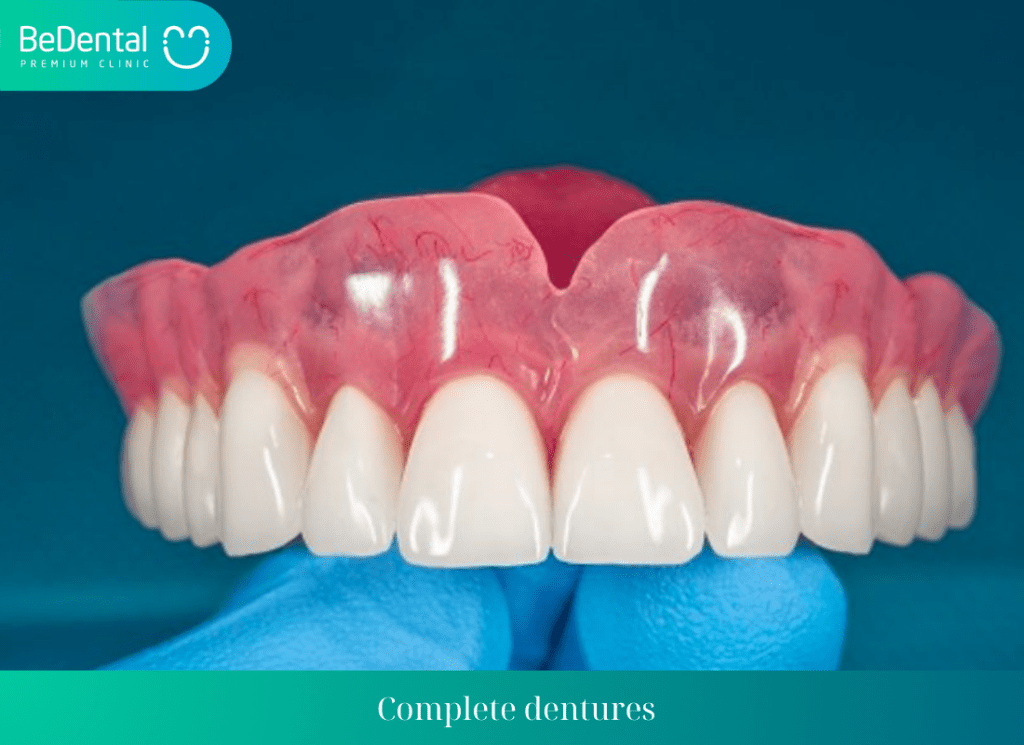
Sometimes, it takes a few months for your gums to recover and change their form before denture can be placed.
To have your denture created and fitted, you can go to either a dentist or a certified clinical dental technician. They vary in that a dentist will measure your mouth and take impressions (molds) of it before ordering complete or partial dentures from a dental technician.
Without having to see your dentist, a clinical dental technician will produce a whole set of denture for you (although you should still have regular dental check-ups with your dentist)
Your mouth imprints will be used to manufacture a trial denture. This will be placed in your mouth by the dentist or professional dental technician so that you can judge how well it fits and how it looks.
See more: Porcelain Veneers and 3 factors influence the price of Porcelain Veneers
Before the final denture is made, the form and color can be changed.
Partial dentures
The holes caused by one or more missing teeth are filled up using partial dentures. A number of false teeth are connected to a plastic, nylon, or metal plate. The majority of the time, it is held firmly in place in your mouth by metal clasps that latch onto some of your natural teeth. It may be simply unclipped and taken off.
Sometimes the clips are constructed of a tooth- or gum-colored substance, although they aren’t always the best options because they are more fragile than metal.
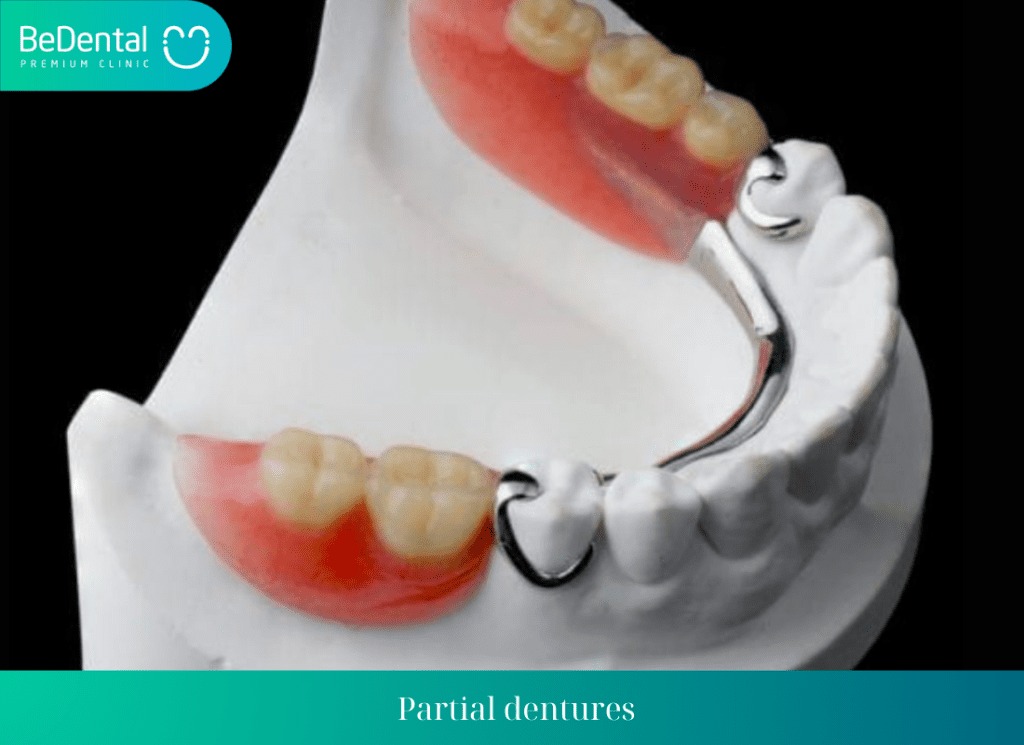
You can see a certified clinical dental technician who can make a partial denture for you after your initial appointment with your dentist for a treatment plan and certificate of oral health, or you can have your mouth measured by your dentist who will then order one for you.
Some people may be fit for a fixed bridge, which is an alternative to partial dentures.
In order to fill the gap, an artificial tooth is inserted between two crowns that have been placed on the teeth on each side of it.
Denture care
Although wearing denture may feel unusual at first, you’ll quickly adjust to them. Initially, you might have to wear your dentures constantly, even while you sleep.
See more: Dental crowns
You might ask your dentist or a professional dental technician if you should take your denture out before bed. Even though it’s not always required, taking off your dentures at night might give your gums a rest.
When you take off your denture, you should keep them moist. You may do this by putting them in water, a polythene bag with cotton wool inside, or an appropriate overnight denture-cleaning solution.
By doing this, the denture material won’t dry out and change form.
Dental hygiene
When you wear dentures, maintaining good oral hygiene is just as crucial. To avoid tooth decay, gum disease, and other dental issues, you should brush your remaining teeth, gums, and tongue every morning and evening using fluoride toothpaste.
Cleaning dentures
Plaque and food residue should be frequently removed from your dentures.
For this reason, dirty denture can also result in issues including bad breath, gum disease, tooth decay, and oral thrush.
Dentures should be cleaned as frequently as natural teeth (at least twice a day: every morning and night).
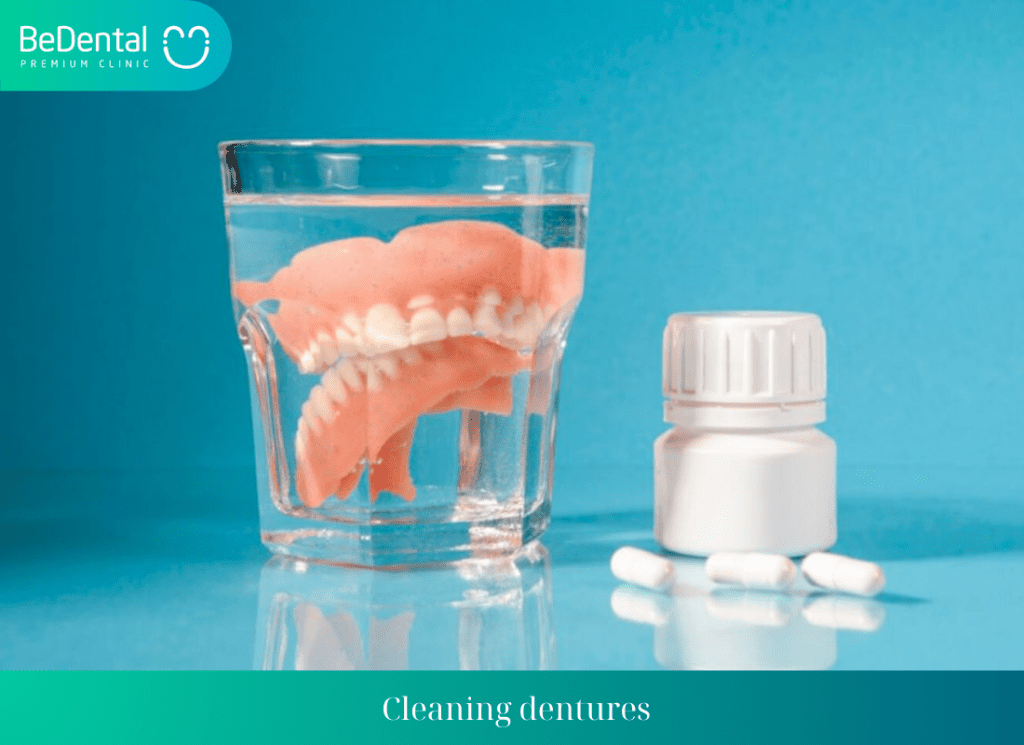
You should:
- To eliminate food particles, clean your denture with toothpaste or soap and water before immersing them.
- To get rid of stains and germs, wash them in a fizzy solution made from denture-cleaning tablets (follow the manufacturer’s recommendations).
- As you would your regular teeth, clean them once more (but don’t scrape them too hard).
Dentures are fragile and can break if dropped, therefore you should clean them over a basin, sink, or something supple like a folded towel.
See more: Composite Veneers and 3 exceptional advantages of Composite Veneers
Eating with dentures
When using dentures for the first time, you should chew gently and with both sides of your mouth while consuming soft meals that have been sliced into little pieces.
Avoid eating anything that is sticky, hard, or has sharp edges, as well as chewing gum.
You can gradually begin consuming different foods until you are once again following your previous diet. Do not ever use a toothpick.
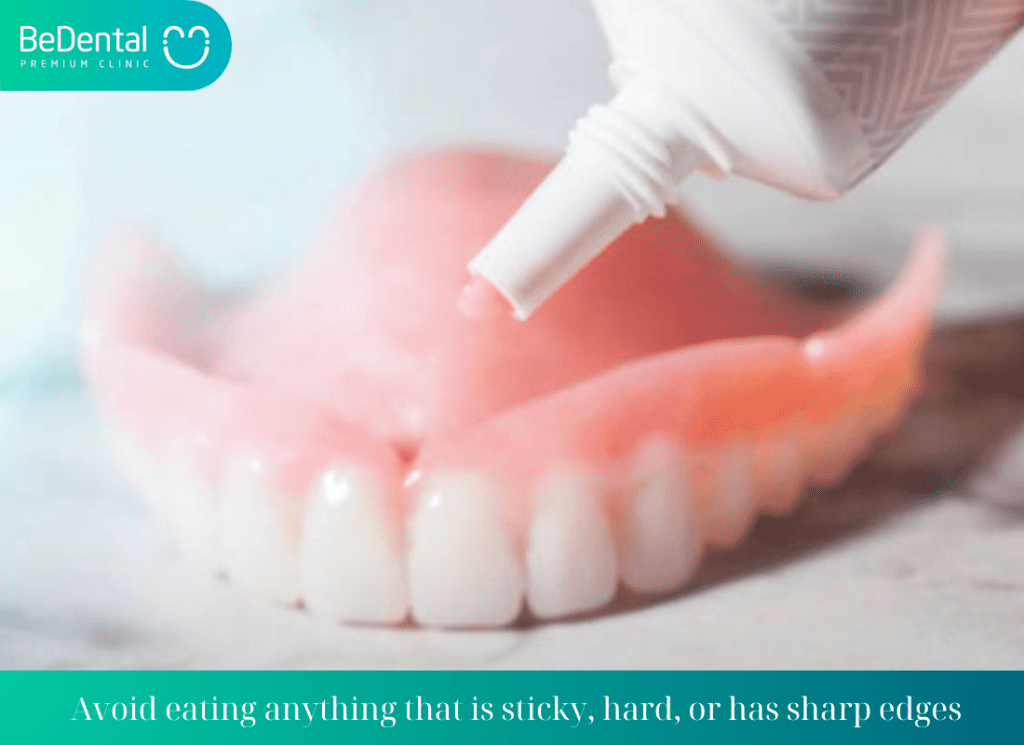
You shouldn’t necessarily need to apply a denture fixative if your dentures fit properly (adhesive).
However, if your jawbone has severely reduced, glue could be your only option for keeping your denture in place. If this is the case, your dentist or a professional dental technician will let you know.
Some people find using adhesive makes them initially feel more comfortable wearing their dentures. Don’t use more than is necessary and adhere to the manufacturer’s directions.
By brushing with soap and water, adhesive can be removed from the denture. Using some wet kitchen roll or a fresh, damp flannel, remove any adhesive residue that has remained in the mouth.
In-office treatment
Even if you have complete dentures, you should keep visiting your dentist periodically so they can look for any issues.
If you treat your dentures well, they should last you for a number of years.
The denture may not fit as well as they once did and may become loose or worn as a result of the inevitable shrinkage of your gums and jawbone.
Visit the dentist as soon as you can. If your denture tend to slip or click when you speak, or if you feel they no longer fit comfortably:
- Your dentures feel awkward.
- You have obvious indicators of tooth decay or gum disease, such as bleeding gums or poor odor, and your dentures are noticeably worn
In addition to causing significant discomfort, old or poorly fitted dentures can also result in mouth sores, infections, or issues with speaking and eating.
Q&A
What type of false teeth is best?
The finest dentures in terms of stability are snap-ins. Using anchors on neighboring teeth or dental implants, these dentures are firmly snapped into position. Patients who lack teeth but have sufficient bone density to sustain an implant may use these dentures.
What is the difference between dentures and false teeth?
In all honesty, dentures and artificial teeth are identical. We can use both words interchangeably. False teeth dentures are synthetic prosthetic devices used to treat dental irregularities brought on by periodontal disease, tooth decay, face trauma, and other diseases.
Can false teeth be fitted permanently?
Thanks to a metal screw that is inserted into the jawbone for support before a false tooth is mounted on top of it, artificial teeth implants are permanent. A single implant or a whole set are also options. Even though implants cost substantially more than dentures, some people are willing to spend the extra money for their permanency.
How long will false teeth last?
They are the recommended dental replacement for people whose gum disease, severe tooth trauma, or aging has caused them to lose the majority of their teeth. However, dentures do not last indefinitely. Even the highest-quality, most resilient dentures often require replacement after 7–10 years.
Can you sleep with denture in your mouth?

No matter what kind of denture you have, sleeping with them is never a good idea and can lead to a wide range of health problems. Make sure to take out your denture every night before bed to maintain your mouth free of germs, your gums healthy, and your bones intact and strong.
Are false teeth a good idea?
One of the most affordable options for restoring lost teeth is denture. Removable denture can, however, start to shift and loosen over time if they are not fitted correctly, which can be annoying and affect speech and eating. Additionally, prolonged use of detachable dentures might cause jaw bone atrophy.
See more: Tooth extraction and 7 common concerns




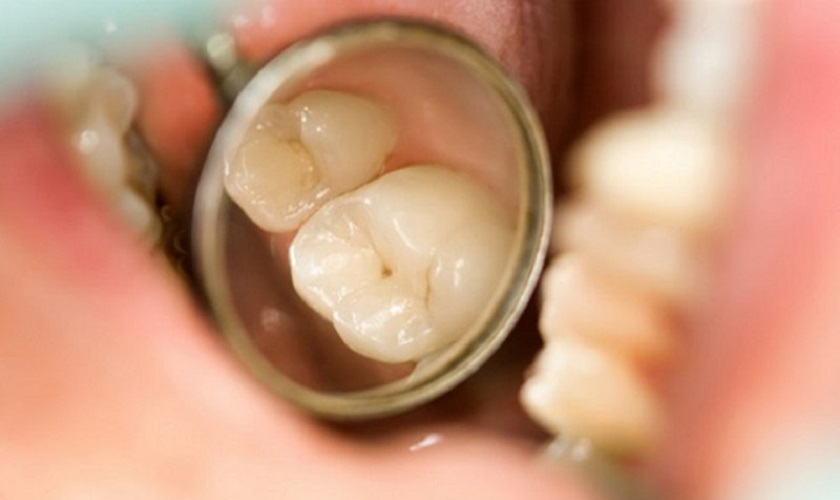
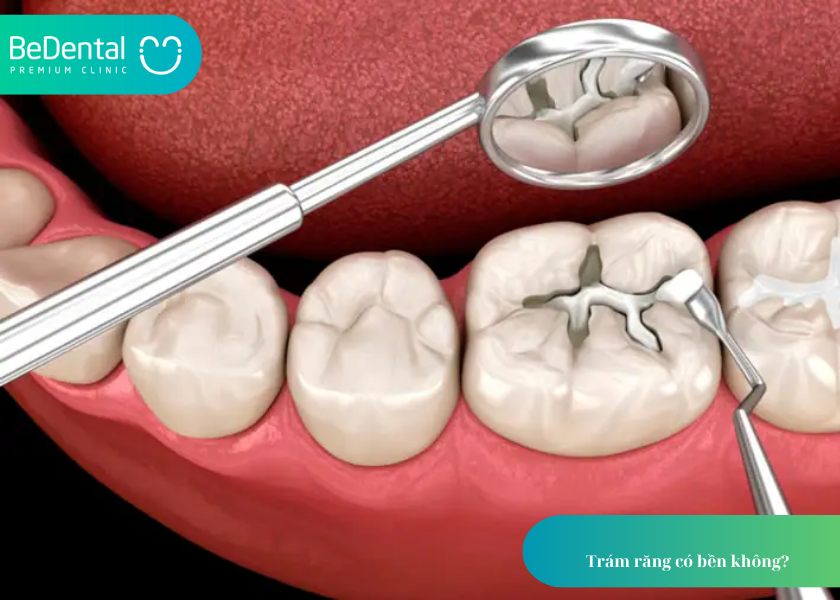
Pingback: Bọc răng sứ cho răng sâu bao nhiêu tiền và quy trình bọc răng sứ cho răng sâu! | Nha Khoa Bedental
Pingback: Chi phí làm cầu răng bao nhiêu? | Nha Khoa Bedental
Pingback: So sánh bọc răng sứ và trám răng/hàn răng! | Nha Khoa Bedental
Pingback: Oral Hygiene: 6 Tips to Improve Oral Hygiene – Be Dental
Pingback: Cost of Zirconia crowns/veneers: Ranging between $800 and $1,500. – Be Dental
Pingback: Best Dental Clinics Near Me in Hanoi | Nha Khoa Bedental
Pingback: Periodontal disease and 12 common periodontal diseases – Be Dental
Pingback: Zirconia veneer and 6 common concerns – Be Dental